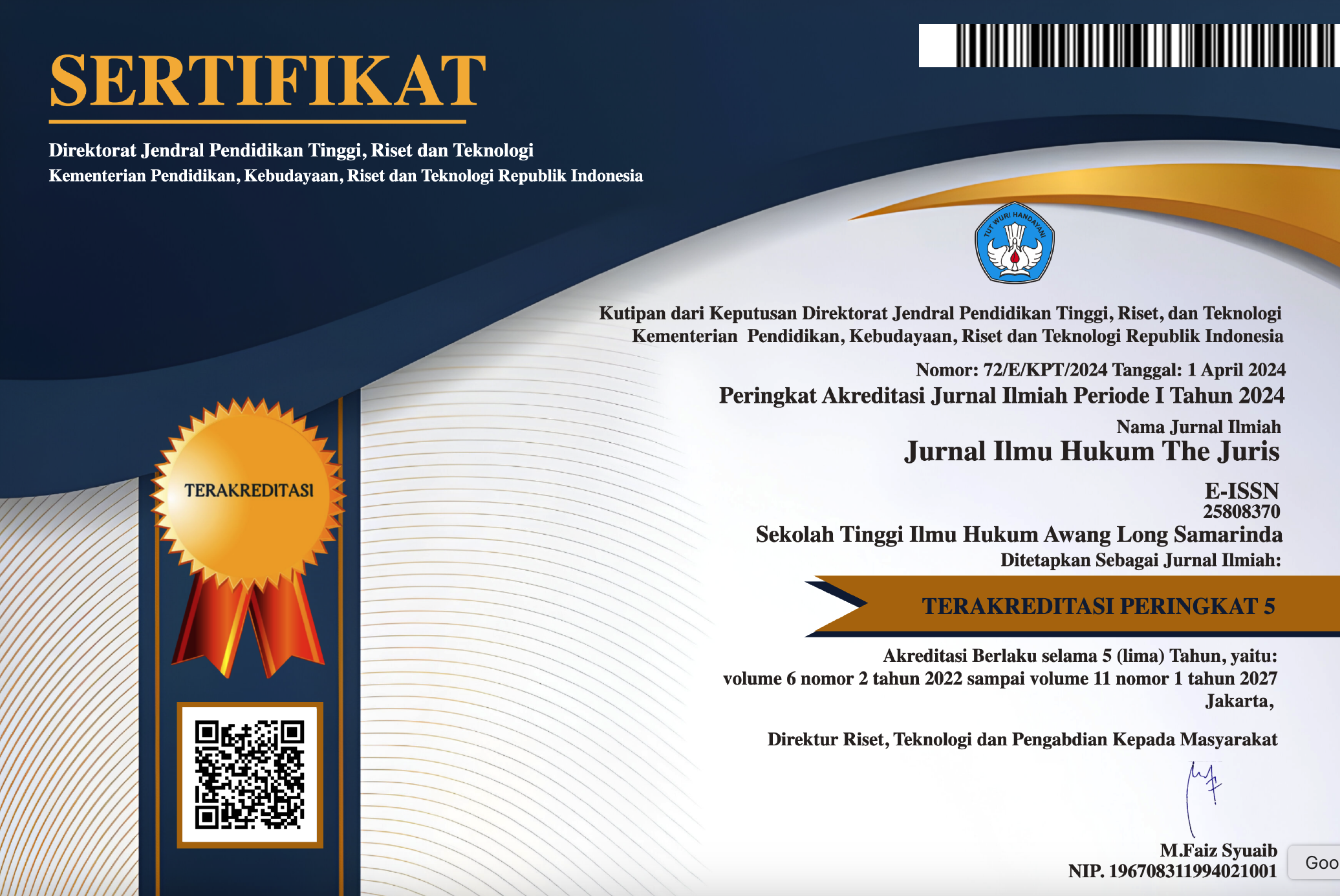RELEVANSI KEPENTINGAN ALAT-ALAT BUKTI DALAM PROSES PENYELESAIAN HUKUM PERDATA
Abstract
This paper discusses the important role of evidence in the civil law evidentiary process. Evidence allows parties to prove or disprove their claims in court. In this process, evidentiary tools such as written evidence, testimonies, depositions, admissions, and oaths become a solid foundation to build a legal case and help the court make a fair decision. The concept and classification of evidence, as well as their strength and hierarchy, become important factors in determining the success of a case in court. The method used is research that belongs to the type of analytical research. In the process, we analyze the relevance of evidence in the context of the case under study. In civil law settlements, the relevance of evidence is an essential aspect. Evidence plays a crucial role in ensuring justice and legal certainty. The classification of evidence, such as primary, secondary, and physical evidence, is important in assessing its probative force. Various theories of evidence, ranging from those that are bound by law to those that give judges freedom, offer diverse approaches in assessing evidence. Although they vary, the ultimate goal is to reach a fair verdict based on the available facts. By understanding and applying the concepts, strengths, hierarchies, and theories of evidence appropriately, the civil law settlement process can be carried out effectively, ensuring that the resulting decision is fair and in accordance with applicable legal principles.
Downloads
References
Brahmana, H.S. Teori dan Hukum Pembuktian, diakses dari https://www.pnlhoksukon.go.id/media/files/20170417150853209334910258f4781588e77_20170419145829_Teori%2Bdan%2BHukum%2BPembuktian.pdf
BbbDaud. (2022). PERANAN SUMPAH SEBAGAI ALAT BUKTI DI DALAM PROSES PERDATA. Vol. 5 No. 1. 19-20. 10.33395/juripol.v5i1.11303
Fernando Kobis. (2017). KEKUATAN PEMBUKTIAN SURAT MENURUT HUKUM ACARA PERDATA. Vol.VI No. 5. https://ejournal.unsrat.ac.id/index.php/lexcrimen/article/view/16675
Juanda, Enju. (2016). KEKUATAN ALAT BUKTI DALAM PERKARA PERDATA MENURUT HUKUM POSITIF INDONESIA. 31-32. http://dx.doi.org/10.25157/jigj.v4i1.409
Krisnawati, Ari. (2015). PEMBUKTIAN PERKARA PERDATA. Diktat Kuloiah, Universtas Udayana. https://simdos.unud.ac.id/uploads/file_pendidikan_dir/ac46262d59f9ea4f78eac3d6f3841958.pdf
Laike, R, j. (2024). ALAT BUKTI HAK ATAS TANAH SUKU MODOLE DALAM HUBUNGAN HUKUM KONKRET. Jurnal Hukum Lingkungan, 7(3), 396-412. https://ejournal.unsrat.ac.id/index.php/lexprivatum/article/view/3968
Momuat, O, M. (2014). Alat Bukti Tulisan Dalam Pemeriksaan Perkara Perdata Di Pengadilan. Jurnal Lex Privatum, 2(1), 134-143. https://bhl-jurnal.or.id/index.php/bhl/article/view/200
Pandiangan, Hendri Jayadi. (2017). PERBEDAAN HUKUM PEMBUKTIAN DALAM PERSPEKTIF HUKUM ACARA PIDANA DAN PERDATA. Jurnal Hukum tô-râ. Volume 3 No. 2. https://doi.org/10.33541/tora.v3i2.1154
Safira, Martha Eri. (2017). Hukum Acara Perdata. CV. Nata Karya
Seknun, Abul Hasan. (2021). SISTEM PEMBUKTIAN PERKARA PERDATA DI PENGADILAN. Justitia. Vol. VIII, No.15. https://jurnal.ummu.ac.id/index.php/justisia/article/view/1290
Saepullah, Asep. (2018). Peranan Alat Bukti Dalam Hukum Acara Peradilan. Vol. 3, No. 1.145. https://www.syekhnurjati.ac.id/jurnal/index.php/mahkamah/article/view/2748
Simanjuntak, P.N.H. (2015). Hukum Perdata Indonesia. Perpustakaan Nasional: Katalog Dalam Terbitan.
Subekti. (2017). Pokok-Pokok Hukum Perdata. Jakarta: Intermasa.
Supada, Bargawa. (2008). PENILAIAN HAKIM TERHADAP ALAT BUKTI AKTA DIBAWAH TANGAN DALAM PROSES PEMERIKSAAN SENGKETA PERDATA DI PENGADILAN NEGERI SURAKARTA. Skripsi thesis, Universitas Muhammadiyah Surakarta. https://eprints.ums.ac.id/id/eprint/874
Ussu, Darliyanti. (2014). HUKUM PEMBUKTIAN DALAM PERKARA PERDATA. Lex Privatum. Vol.II, No. 1. https://ejournal.unsrat.ac.id/index.php/lexprivatum/article/view/3967
Yahya Harahap. (2015). Hukum Acara Perdata. Penerbit Sinar Grafika, Jakarta, Cetakan Ke 15.
Copyright (c) 2024 Khansa Laily Az Zahra, Moh Fadwa Mufid Al Amjad, Syafa Nabya Maulidian, Septiani Silvia, Fadilla Azfa Asyifa

This work is licensed under a Creative Commons Attribution-ShareAlike 4.0 International License.







